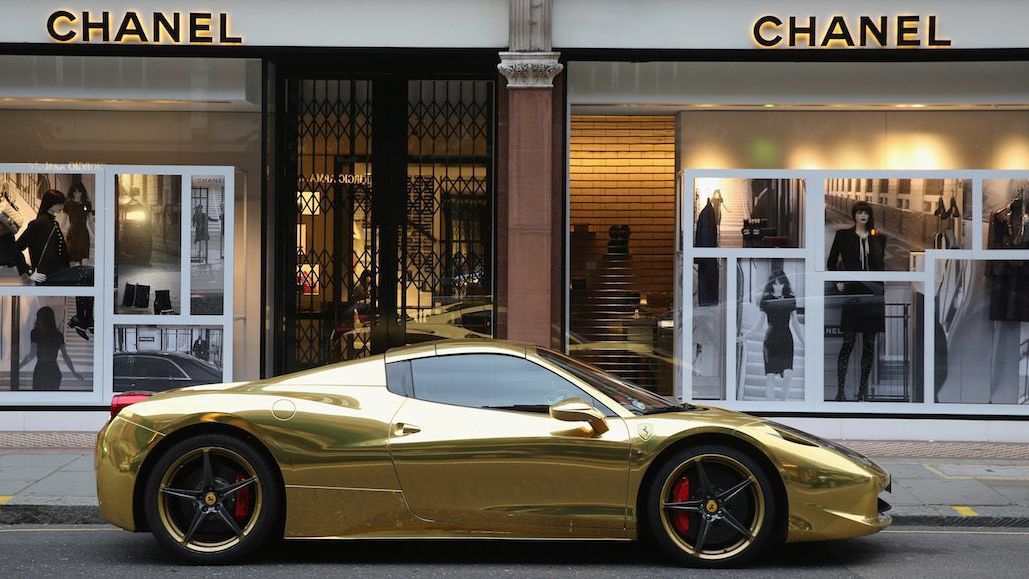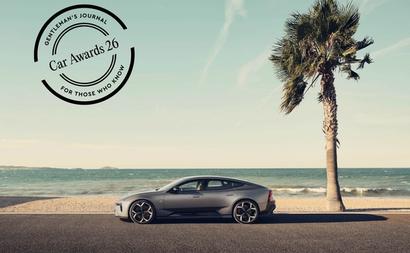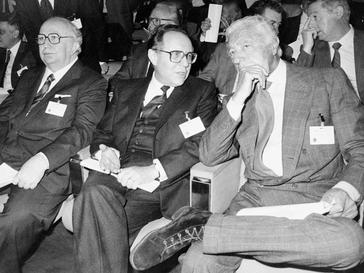

The story of London’s million-pound supercars
Richard Holt investigates the insane cars taking over our streets
- Words: Richard Holt
The million-pound supercars heard roaring around London’s streets are more than just status symbols – they’re a sign that Middle Eastern money is changing the face of London… for better or worse.
What sound evokes summer for you? Is it the gentle breaking of waves on the beach, the unmistakable thwack of bat hitting ball or the excited chatter of northern Europeans who can barely believe that they are sitting outside without being viciously assaulted by the elements.
In London’s smartest postcodes, however, there is a new sound: the visceral scream of exotic sports cars being raucously revved as they charge past. This new phenomenon is known as Supercar Season. Young men, mostly from the Middle East, pay tens of thousands of pounds to have their super-flashy vehicles flown into London for the summer months. They then appear to play a complicated game in which the winner is the man with the loudest engine, the most tasteless paintjob and the greatest number of parking tickets.
Young men, mostly from the Middle East, pay tens of thousands of pounds to have their super-flashy vehicles flown into London for the summer months.
Getty images
Every year The Daily Mail publishes pictures of the dozens of million-pound, gold-plated Ferraris, Lamborghinis and Paganis parking illegally outside Harrods, with their Arabic number plates causing the traffic wardens a great deal of head-scratching. That’s the problem with foreign cars – you let one of them in, and before you know it they are everywhere.
The public’s reaction to Supercar Season has been mixed. It has had something of a Nicki Minaj effect: some people think it is amazing; others find it incredibly irritating.
During last year’s season, a mild-mannered pensioner – who had never in his life so much as stolen a little bottle of hotel shampoo – was so incensed by the sound of the cars that he was driven to a moment of violent madness. John MacGowan had complained to police about the cars racing up and down Sloane Street, in Knightsbridge. Angry that he was not being adequately protected by the law, Mr MacGowan came over all Charlie Bronson, and keyed a £2,305-deep scratch down the side of a souped-up Mercedes.
Once his law-abiding equilibrium was regained, Mr MacGowan made a full confession to his crime. He was taken to court and fined and, while apologising to magistrates for such out-of-character behaviour, said he found the sound of the engines ‘painful as well as annoying’ and that he had acted ‘out of sheer frustration’.
(Photo by Dan Kitwood/Getty Images)
But some people cannot get enough of the invading army of sports cars. With the increasing quantity of automotive erotica on the streets, there are correspondingly swelling ranks of car fanciers hanging around outside posh shops and hotels like groupies, hoping to catch sight of something special. Rather than shaking their heads sadly and reaching for the nearest sharp object, the supercar spotters whoop excitedly and film the cars on their smartphones. And for them, the more gaudily painted and aggressively accelerated the motors are, the better.
The more gaudily painted and aggressively accelerated the motors are, the better.
One clever young man has even made a successful business out of it. Paul Wallace started a YouTube channel, Supercars of London, in 2007, documenting the then-new phenomenon. His videos are watched by two million people a month, and he makes so much money from advertising and sales of branded clothing that he is now able to buy his very own supercar.
The local authorities, however, are very much on the side of the haters. This summer, drivers in the Royal Borough of Kensington and Chelsea face the terrifying wrath of the newly drawn-up ‘supercar-Asbo’. Under the terms of this Public Space Protection Order, drivers are warned against ‘revving engines, rapid acceleration, racing’ and, somewhat bizarrely, ‘performing stunts’. Anyone guilty of these disturbances will be hit with a £100 fine. For the man who has just paid £40,000 to have his million-pound Bugatti flown in, that could be the thing that tips him into the financial abyss.
But people from the Middle East don’t just come here to show off their cars. Many of them are making London their home, not just their seasonal racetrack. A joint survey by estate agency Cluttons and YouGov of wealthy investors from Saudi Arabia, UAE, Qatar, Bahrain, Oman and Kuwait revealed that London is their favourite city to invest in property – ahead of New York and Singapore.
Why the attraction to London, when there are so many other places for the Middle Eastern elite to choose from? ‘There are a number of “pull factors” that London offers,’ according to Darren Yates, Head of Research at the estate agent Carter Jonas. ‘It has a large, liquid and transparent property market; it provides a relative safe haven for investment, notably political stability plus the ability to get money out if needed. It offers world-class shopping, leisure and dining facilities and excellent transport connections. It also has many excellent schools catering for the international community. Essentially, London is a magnet for wealthy individuals who want to live, work, do business and get their kids educated in a thriving global city.
Essentially, London is a magnet for wealthy individuals who want to live, work, do business and get their kids educated in a thriving global city.
‘In terms of property market specifics, London has also been a top performer on the global stage – turning in very strong capital growth, which has been an additional draw for investors.’
But it isn’t just a question of unfettered growth. ‘Middle Eastern buyers have been prominent for several decades, on the back of the rise in oil wealth in the region,’ adds Yates. ‘During the 2008 financial crisis, investment from the region experienced a lull as they came to grips with their own financial and property market headwinds. However, the Arab Spring of 2011 led to a renewed influx of investment from the region, as the wealthy took their money out of countries that were experiencing significant political and civil unrest.
‘Currently, the Middle East is going through a tricky period in terms of politics and investment from the region has been quiet. However, this is not peculiar to the London property market, with most global cities such as New York and Sydney also seeing markets pause for breath after long periods of price growth. While we may see a short-term lull in Middle Eastern activity in the London market, we believe it will continue long-term, given the historic ties and the strength of the UK’s current relationship with the region.’
One of the factors causing something of a short-term lull is oil prices which, having recovered well after the financial crisis, fell significantly in 2014 and have struggled to recover. You may think that this is a good thing, because it costs you less to fill up your car, but spare a thought for the Saudi Arabian investor who is worrying where his next penthouse is coming from. Don’t fret for them too much, however, as the effects of the low oil prices should not be overstated, according to a report by the real estate and investment firm CBRE.
‘Despite low oil prices, Middle Eastern investors remain very active in global real estate markets. The UK, and London in particular, continues to attract a large proportion of Middle East investment. Of the £68.6 billion invested in UK real estate in 2015, £30.5 billion came from foreign buyers, of which £3.6 billion was investment from Middle Eastern buyers, [an increase of] 15 per cent year-on-year.
Of the £68.6 billion invested in UK real estate in 2015, £30.5 billion came from foreign buyers, of which £3.6 billion was investment from Middle Eastern buyers
While the CBRE figures show Middle Eastern money accounting for around 12 per cent of foreign investment, that proportion is far higher when you look at the more expensive areas of the capital.
‘More than 50 per cent of the investment in Mayfair is coming from the Middle East,’ says Peter Wetherell, chief executive of his eponymous West London estate agent. Is there any downside to such dominance of the market by investors from one region?
‘More than 50 per cent of the investment in Mayfair is coming from the Middle East,’ says Peter Wetherell, chief executive of his eponymous West London estate agent.
‘I don’t see anything negative about it. We should feel proud that London is seen as the number one international destination. It is not about lights out London, it is about the positive economic effects that flow down from overseas investment.’
But it is not surprising that an upmarket estate agent is pleased about all the money flowing in – he is hardly likely to suggest that it would be better off spent elsewhere. Among those who are less than keen is London’s new mayor who, in criticising foreign investment in the capital, has singled out the Middle East, even suggesting that some of the deals being made are not entirely above board. As soon as he took office, Sadiq Khan stated that it was a priority to increase the amount of ‘affordable’ housing.
‘It is possible to build 50,000 homes a year,’ he told the London Assembly. ‘But there is no point if they are all bought by investors in the Middle East and Asia for use as second homes or they sit empty. I don’t want us to be the world’s capital for money laundering. I want to give first dibs to Londoners.’
That last bit echoes Gordon Brown’s ‘British jobs for British people’ speech made shortly after he became PM. It comes from the school of political thought that says throwing out unworkable soundbites is fine – the most important thing is telling the gullible voters what they want to hear. Nevertheless, the cost of property in the capital has been a big issue for politicians of all persuasions. Prices in London have soared recently, while other parts of the country are still struggling to get back up to pre-2008 prices. According to the property website Rightmove, the average price paid for a property in London was £556,350 in 2015 – a figure that rises to almost £1.4m in the more expensive boroughs.
Iraqi-born Raed Hanna is MD of Mutual Finance, a London property finance company working closely with the Middle Eastern market. Although he thinks that overall the effect of Middle East investment is a positive development, he admits that the upward effect on the housing market does not necessarily benefit everyone.
‘I came to the UK from Iraq in 1977. During that time London has changed culturally for the better. A lot of people come here from all over the world to enjoy life. Now it has the best restaurants in the world.
‘London is good for two types of people: the poor, who can be supported by the government, be given free housing and healthcare; and the very wealthy, who come here for the freedom and the safety, and have big houses and helicopters. It is not so good for those in the middle. With property prices as they are, you can’t live in central London and be a secretary.’
And the housing market is not the only sector being chomped into by Middle East money. Business premises are being bought up at a staggering rate too.
‘Since 2007, Middle Eastern investors have spent more than £100 billion on commercial real estate globally,’ says Tom Leahy, a market analyst from Real Capital Analytics. ‘Of this, £20 billion was spent in central London, which is the number one destination for the mix of Middle Eastern sovereign wealth funds, high net-worth individuals and investment managers when investing in property outside their home region. London’s dominance is emphasised by how this £20 billion figure is almost double second-placed New York and four times the amount investors have spent in third-placed Paris.
LONDON, ENGLAND – JUNE 28: An aerial view of the Shard on June 28, 2012 in London, England. Standing at 309.6 metres high the Shard is the tallest buliding in Europe and was designed by architect Renzo Piano.
‘The driving force behind this movement of capital has been the sovereign wealth funds of Qatar, Abu Dhabi and Kuwait, with the Qataris accounting for over 40 per cent of all investment from the Middle East into central London.’ If people in provincial Britain are feeling a bit left out of the Middle East’s spending frenzy, this is with good reason. While there is some investment outside of London, this is very small in comparison to the amount poured into the capital, as Leahy explains:
‘While central London is the market of choice for Middle Eastern investors, there has been relatively little spill-over in demand out into the regions,’ he said. ‘Just £250 million was invested outside London in 2015 and £190 million in 2014.’
Despite commercial investment coming from all over the Middle East, particularly the Gulf, it is the spending spree of the tiny oil and gas-rich state of Qatar that has made the most noise. Last year Qatar’s ruling al-Thani family bought a £72.5m office block in London’s Euston. Along with several upscale residential properties, 2015 also saw Qatar’s sovereign wealth fund buy three of London’s finest hotels, the Berkeley, the Connaught and Claridge’s. Qatar has also bought, or has major stakes in, the Shard, Harrods, the Olympic village, No 1 Hyde Park, Chelsea Barracks, the US Embassy building, Barclays Banks, Sainsbury’s and IAG, the company that owns British Airways.
It is almost as if they are playing a game of Monopoly-bingo with trophy assets. They would surely buy Buckingham Palace if they could. With the Queen not thinking of selling, Qatar did plan to build its very own palace by knocking together three prime residences in Regent’s Park for the UK’s first £200 million home. Sadly a spoilsport from the council said the plan would not fit in with its commitment to create affordable housing.
Well, it is certainly affordable to us, the Qataris presumably muttered, before offering the council £850,000 to help oil the wheels of local governance. This was absolutely not a bribe of any sort – it was a kindly contribution to help the council provide more affordable housing. In a rare example of anyone finding the strength to turn down Middle Eastern money, the council declined the offer.
But to think about the Middle Eastern influx as just being big money is wrong. Mais Haddadin, who is originally from Jordan, came to live in London ten years ago. A chemical engineer by training, she is now a business adviser at Pera Consulting.
‘People from different parts of the Middle East come for different reasons,’ she said. ‘While the people from the Gulf come to escape the heat and buy property, often people from the Levant countries – Jordan, Lebanon, Palestine, Syria – come here because the economies at home are weak and they are seeking better opportunities. In Jordan we have a highly educated people, and they are our main export.’
‘I hate Supercar Season. There are certain people from the Middle East who arrive and impose their culture on Britain, showing off their wealth and treating it like a playground. This is only one tiny proportion of the Middle Eastern people, but sadly it is the part that everyone sees.’
1 Hyde Park, London
Skyscrapers, stadiums and supercars may be the most visible symbols of Middle Eastern investment, but it runs deeper, and all politicians realise that foreign money is vital to keep our economy successful. There are of course scaremongering stories about London being ‘sold off’. But when foreign investors buy buildings, those buildings stay part of Britain, only they are owned by people from another part of the world.
Is there something inherently worrying about this foreign ownership? With large-scale investment from the Middle East, there is sometimes a sense of concern, often compounded by deeper fears about ethics and – although we are shy of saying it – religion. We have the right to question the human rights records of any country we choose. And also require that they speak out against the horrors being carried out under the guise of religion. But there is no reason we cannot retain our own national values while still seeing it as a sign of our own success that other countries want to come and spend their money in London – or even other parts of the UK if they discover that there is also life beyond the Congestion Charge zone. Keeping foreign buyers out will make us all poorer.
And should we really care if this foreign money is buying up Britain? They can call it the ‘Emirates’ FA Cup but we are, as far as I am aware, still permitted to call it just the plain-old FA Cup without fear of being flogged in public. And we should remember that the supercars are just the gold-plated tip of the iceberg. Just in case your view of London has got jammed on some image of a bowler-hatted past, the capital has changed. A man from the Middle East – regardless of his mode of transport – can be just as much of a Londoner as the cockney sparrow in a white van.


